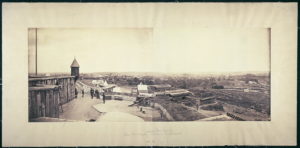Angela Sutton: Digital Initiatives for Public Engagement: Storytelling and Oral Histories of the Descendants of Fort Negley
Digital Initiatives for Public Engagement: Storytelling and Oral Histories of the Descendants of Fort Negley
There is a fortification on St. Cloud Hill, right next to Nashville’s Adventure Science Center, called Fort Negley. Beneath it are buried countless stories untold that we may never get a chance to recover. This fort played a pivotal role in the Civil War. It was built by African Americans, both enslaved and free, and defended by the US Colored Troops, who repelled the Confederate Army down into central Alabama. After the war, it was allowed to fall into disrepair, though the African-Americans who built and defended it stayed close by, forming the historically black neighborhoods of Chestnut Hill and Edgehill.
There are people in Nashville whose great-grandparents built Fort Negley, and others who defended it in the regiments of the US Colored Troops during the Battle of Nashville. They helped to bring an end to the Civil War, and to legal enslavement in the US. Some of these descendants have medals and other relics from that era, and these objects come with stories that have been passed down throughout the generations. Several others, like Gary Burke of the Battle of Nashville Preservation Society, memorialize this space by acting out the history of their families through military reenactments and live historical interpretation.
As a scholar of Africans and their descendants in the Atlantic World, this fascinates me. As a digital humanist, my urge is to use the skills and tools to which I have access, to capture some of these fleeting intergenerational memories, and find ways for others to access them.
 And so a new working group was born: Digital Initiatives in Public Engagement. Vanderbilt University’s growing enthusiasm for community outreach, service learning, and immersion felt like the perfect environment in which to investigate ways in which the digitally inclined can use our skillsets and available tools/equipment to engage with and serve the surrounding communities.
And so a new working group was born: Digital Initiatives in Public Engagement. Vanderbilt University’s growing enthusiasm for community outreach, service learning, and immersion felt like the perfect environment in which to investigate ways in which the digitally inclined can use our skillsets and available tools/equipment to engage with and serve the surrounding communities.
This year we are focusing on Fort Negley Park. It makes sense because of our preexisting relationship with the employees at Fort Negley, and the personal and professional interests of several colleagues in the group. A couple of us have woven Fort Negley into our classes on Historic Black Nashville and the Digital Humanities. Others have worked with the fort to sponsor historical markers to educate the public about this unique space. I created the nomination for the UNESCO Slave Route Project , which would put Fort Negley on a global map of significant sites that tell the history of enslavement and freedom. What I’m saying is: we’ve done the background research. This saves us time and lets us jump right into the digital.
We used our first meeting to firm up the plan: We are going to find as many local descendants and others who have family history and memories (and perhaps artifacts) of this Fort in the Civil War and Reconstruction era. We will collect their stories in various digital formats. Some of us in the group have extensive experience with storytelling, writing, interviewing, and video/audio editing, and can call upon that to produce some professional end products. Then we will work with the Vanderbilt Library to ensure this data remains preserved and accessible to researchers and students, and with the Fort Negley Visitors Center to allow the public to access these local treasures.
There’s always room for more in our working group. Anyone interested should contact me (Angela.C.Sutton@Vanderbilt.edu) and I promise, we’ll put you to work.